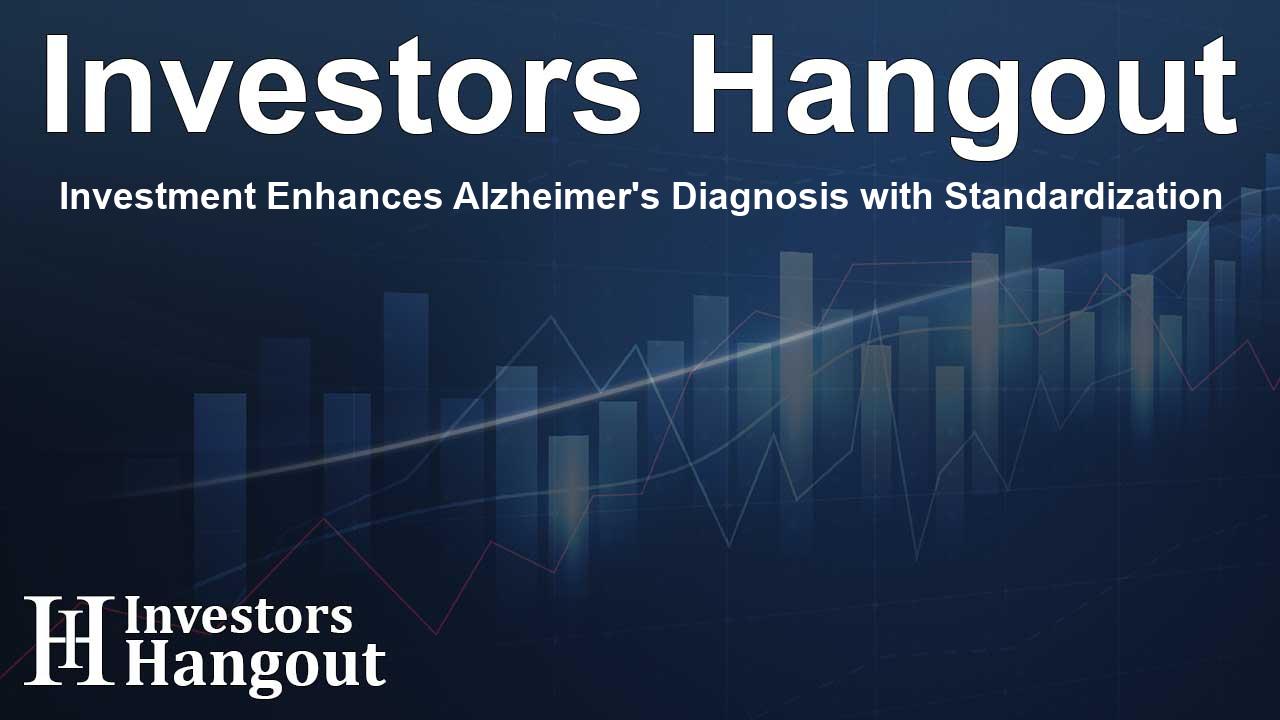Investment Enhances Alzheimer's Diagnosis with Standardization

Pioneering Investment for Enhanced Alzheimer’s Diagnostics
The Alzheimer's Drug Discovery Foundation (ADDF) has taken a significant leap towards improving Alzheimer’s diagnosis with a keen investment strategy. Partnering with experts, including Dr. Henrik Zetterberg and Dr. Nicholas Ashton, the foundation is championing the creation of critical reference materials for the p-Tau217 blood biomarker. This initiative aims to foster consistency in research and clinical settings globally.
Objective of the Initiative
The ADDF's recent investment of $1.18 million to the University of Gothenburg is dedicated to developing standardization materials specifically for p-tau217 blood tests, recognized as a leading diagnostic biomarker for Alzheimer’s disease. Drs. Zetterberg and Ashton, both renowned figures in the field, lead this essential project, seeking to establish a certified reference material that developers can utilize to ensure efficacy in their p-Tau217 blood tests.
Transformative Potential of Blood Tests
Dr. Howard Fillit, Co-Founder and Chief Science Officer of the ADDF, expressed the transformative potential of blood tests in Alzheimer’s diagnosis. He noted that as science accelerates, tools that provide a consistent standard across clinical settings are crucial for advancing diagnostics. This initiative not only aims to enhance accuracy but also ensures that patients worldwide receive dependable diagnoses. Such precision is paramount for effective treatment options for individuals facing this debilitating condition.
Advancements in Alzheimer's Research
Standardization efforts, previously made with cerebrospinal fluid biomarkers like A?42, have significantly pushed forward Alzheimer’s research. The harmonization of p-tau217 in blood can lead to understanding the disease's complexities, enhancing our capacity to diagnose and treat it. The insights from standardizing these biomarkers pave the way for a broader acceptance and utilization of blood tests in Alzheimer’s diagnostics.
Support from the Diagnostics Accelerator
With over $70 million already invested in nearly 70 projects, the Diagnostics Accelerator (DxA) is committed to making diagnostics accessible, affordable, and scalable. The portfolio not only includes blood tests but also encompasses retinal scans and various digital tools designed for early diagnosis, screening, and preventative measures. As Alzheimer’s research progresses, implementing standardized protocols will ensure that diagnostic methodologies evolve efficiently to meet patient needs.
Future of Alzheimer's Treatment
Dr. Fillit envisions a future where blood-based biomarkers like p-tau217 become central to Alzheimer’s treatment strategies, including innovative combination therapies and personalized medicine. He emphasized that these tools are moving diagnostics closer to that of other age-related diseases, providing clarity and precision in treatment strategies, similar to cancer therapies where biomarkers determine treatment routes.
About the Alzheimer's Drug Discovery Foundation (ADDF)
Established in 1998, the ADDF focuses on expediting drug discovery for Alzheimer’s disease. Utilizing a venture philanthropy model, it funds critical research initiatives in both the academic and biotech sectors. The foundation has a notable legacy, having contributed over $290 million to support various Alzheimer’s drug discovery programs and clinical trials across multiple countries, all stemming from its dedication to tackling Alzheimer’s disease.
About the Diagnostics Accelerator (DxA)
Launched in 2018, the Diagnostics Accelerator is a global initiative aimed at developing novel biomarkers for early Alzheimer’s detection. Backed by a generous $100 million, the initiative collaborates with high-profile partners who are committed to advancing the clinical frameworks surrounding Alzheimer’s diagnostics and treatments. This concerted effort encourages the research community to devise novel biomarkers and ultimately progresses the development of targeted treatments for Alzheimer’s disease.
Frequently Asked Questions
What is the purpose of the investment made by ADDF?
The investment aims to develop standardized reference materials for the p-tau217 blood biomarker, which is crucial for Alzheimer's diagnostics.
Who are the leading scientists involved in this project?
Dr. Henrik Zetterberg and Dr. Nicholas Ashton are leading the project at the University of Gothenburg.
How much funding is allocated to this initiative?
The ADDF has invested $1.18 million into this project to support the standardization efforts.
What is the significance of standardizing p-tau217?
Standardizing p-tau217 is expected to enhance the accuracy and reliability of blood tests used in diagnosing Alzheimer’s disease.
How long has the Alzheimer's Drug Discovery Foundation been in operation?
The ADDF was established in 1998 and has since committed substantial resources to Alzheimer's research and drug development.
About Investors Hangout
Investors Hangout is a leading online stock forum for financial discussion and learning, offering a wide range of free tools and resources. It draws in traders of all levels, who exchange market knowledge, investigate trading tactics, and keep an eye on industry developments in real time. Featuring financial articles, stock message boards, quotes, charts, company profiles, and live news updates. Through cooperative learning and a wealth of informational resources, it helps users from novices creating their first portfolios to experts honing their techniques. Join Investors Hangout today: https://investorshangout.com/
Disclaimer: The content of this article is solely for general informational purposes only; it does not represent legal, financial, or investment advice. Investors Hangout does not offer financial advice; the author is not a licensed financial advisor. Consult a qualified advisor before making any financial or investment decisions based on this article. The author's interpretation of publicly available data shapes the opinions presented here; as a result, they should not be taken as advice to purchase, sell, or hold any securities mentioned or any other investments. The author does not guarantee the accuracy, completeness, or timeliness of any material, providing it "as is." Information and market conditions may change; past performance is not indicative of future outcomes. If any of the material offered here is inaccurate, please contact us for corrections.